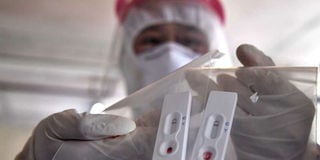Concern as cases of Covid-19 patients without symptoms rise

A medic displays a new rapid testing kit for Covid-19. PHOTO | LILIAN SUWANRUMPHA | AFP
What you need to know:
- Health ministry says there is evidence of asymptomatic cases, sparking fear of unwitting community transmission.
- Being asymptomatic means that you have no symptoms and therefore require no treatment.
- Globally, studies published have found that asymptomatic cases account for between five per cent and 80 per cent of people testing positive for the virus.
When he appeared on national TV, Director-General for Health Patrick Amoth was hard-pressed to explain why a patient in Homa Bay County had been hospitalised yet he wasn’t receiving any treatment for coronavirus.
This question was raised after a video of the patient identified as Kevin Aura went viral on social media, claiming he was healthy despite the Ministry of Health insisting that he had tested positive for Covid-19.
Dr Amoth explained that Mr Aura was rightly admitted because samples taken from him for Covid-19 came back positive.
“Kevin is case number 257, and he's not being treated because he doesn’t display symptoms. The test was done in Kemri Kisumu and turned positive,” Dr Amoth.
ASYMPTOMATIC
Mr Aura, 26, is one of the patients considered to be asymptomatic, who now account for almost half of the confirmed cases in Kenya.
As daily numbers of confirmed cases rise, the ministry says there is evidence of asymptomatic cases, sparking fear of unwitting community transmission. Being asymptomatic means that you have no symptoms and therefore require no treatment.
“Fifty-six per cent of the 281 cases are asymptomatic, but are being isolated as the ministry waits for the virus to pass on during the 14 days in a process known as viral shedding,” Dr Amoth added.
Globally, studies published have found that asymptomatic cases account for between five per cent and 80 per cent of people testing positive for the virus. But screening misses these people because most are symptom-based screening.
This means that Covid-19 patients who do not develop and show any signs are a source of concern as Kenya battles to flatten its curve.
Dr Amoth said this has important implications for infection control since they rely on presence of signs and symptoms to identify and isolate patients who might have Covid-19. This, he added, is because there is no specific treatment for Covid-19 and the best way to handle each patient is to give them medication based on symptoms.
FEVER
With patients with no symptoms like fever or even sore throat, there’s no need to give medication. He explained that the man would be required to stay in hospital for 14 days and after both follow-up tests turn negative.
“We're keeping Kelvin in the isolation centre until the 14th day when we’ll start repeating the tests to see if he turns negative. If released now, he will pass the disease onto others. We don’t have to give him any treatment because he is asymptomatic. If you don’t have any symptoms, we keep you there until the disease runs its incubation period,” he added.
Dr Majid Twahir, the associate dean for clinical affairs and chief of staff at Aga Khan University Hospital, said people who present with mild or no symptoms can be the most dangerous in regard to transmission.
Since most of them are healthy and not aware that they have the virus, they can end up transmitting it to high-risk groups like the elderly or people with pre-existing illnesses, he said.
Just because you have mild or no symptoms does not mean the people you spread the virus to will have the same symptoms,” he said.
Dr Twahir explained that the best way to ensure people are safe is to maintain social distance and wear a mask.
This would ensure less virus will be circulating. “Wearing masks interrupts transmission because it tracks droplets. The face mask protects the people around you and ensures you don’t infect others,” the doctor said.
The prevalence of asymptomatic transmission does not augur well for global containment efforts as Bill Gates recently wrote in an article published in the New England Journal of Medicine.
“That means Covid-19 will be much harder to contain than the Middle East respiratory syndrome or severe acute respiratory syndrome, which were spread much less efficiently and only by symptomatic people,” Gates said.






